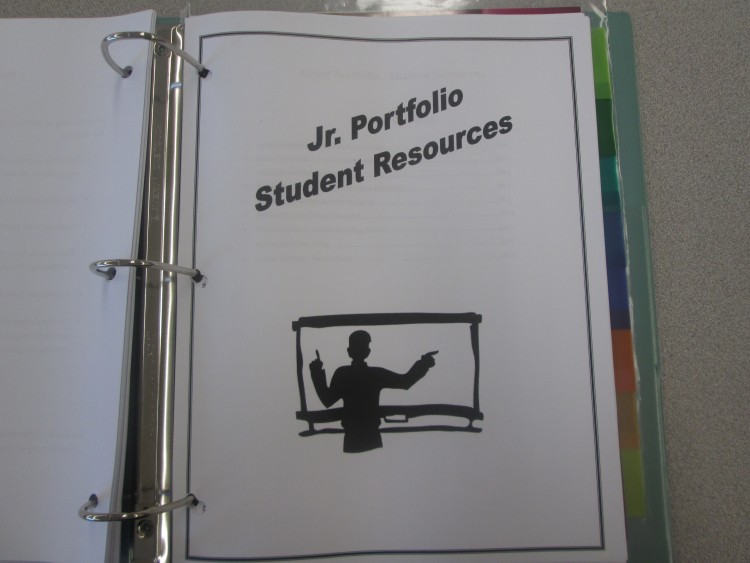Written by Julia Hornyak |
It’s only a couple months away from the dreaded Junior Portfolio: the two words that make every Junior cringe. Juniors have heard about this event for three years and have prepared for it almost their whole high school career. They have been told in the past to not stress over it by the class of 2015, but last year the process was changed so that students would have to use double the rubrics (14) if they wanted to earn distinction. If students pass with distinction, they receive a red, white, and blue cord at graduation.
Junior Portfolio is a great way to get reconnected with old teachers not only from Morgan, but also Eliot, Pierson, and Joel. These teachers are excited to hear about their past students’ accomplishments in high school. The Junior Portfolio teaches students the speaking skills they will need when applying for a job and going for an interview in front of a panel of people. It is also a great way for students to reflect on their hard work over the past three years.
Here are some tips from the Seniors this year who successfully completed Junior Portfolio last year:
- “Prepare in advance and don’t procrastinate.” -Sami Ashton

- “Practice and have what you’re going to say prior, but don’t stress over it.” -Riley Thompson
- “Make sure you have every single piece of information you need. Start early and ask many questions so you know exactly what you have to do. Be confident in your work” -Chelsea Pacheco
- “Start preparing now and make sure you have work for every rubric and signatures because you do not want to be running around the week before trying to get your work signed.” -Julia Hornyak
- “It’s not as hard as it seems. Junior Portfolio is really exciting as you approach it. It’s an opportunity to dress nice, give a confident presentation, and then you’re done! It doesn’t require a large amount of prep, just make sure to save your rubrics.” -Michael Baker
- “It is way easier than you think. Whenever you get a rubric just save it right away and collect them as soon as possible. Choose rubrics that have assignments that you can talk about. The presentation is a great experience because being able to talk in front of people is a valuable trait. Just look sharp, speak confident and you’ll slay it.” -Mateo Zumpano
- “It’s much easier than you think. I happen to be effective with public speaking, so I didn’t make a script. I suggest not making a script because my panel told me they appreciated how I went up there and just talked my mind, unlike 99% of people who used a script.” -Connor Crowley
- “Don’t stress out. It isn’t that bad. Just write down on a piece of paper what you need to talk about and reference it during your presentation. It’s basically impossible to fail unless you are missing something because the teachers will prompt you if you forget to mention something.” -Arielle Passante
- “Stay organized! I kept everything in my bin in advisory and it really helped when it came time to prepare for this. Make sure you keep collecting those rubrics so you make it easier for yourself when the time comes. Don’t stress too much, it’s much easier than it seems!” -Kayla Burt
- “Junior Portfolio is definitely not as hard as you think it is going to be. But even though it isn’t, you still need to worry about it in the long run. I didn’t really save anything throughout my freshman and sophomore years and didn’t really think much of it. That was until its deadline was coming up faster and faster, I was scrambling for rubrics last minute and it was not pretty. So just save your work and that’ll make it an easier experience.” -Gabriella Rodriguez
- “Make sure you keep everything with a rubric on it!! Even if it’s a bad grade you can still use it to show progress. Also I made a full script the week before of exactly what I wanted to say for each rubric and how I planned on explaining my progress because I was going for distinction. Also try to bring as many of the assignments you will be talking about as possible because it helps to show the panel the actual project or essay you’re talking about and gives you stuff to reference. And try to reference the school-wide rubrics as much as possible. But most importantly, don’t freak out! It’s going to be fine and you’ll get through it. It’s not as bad as it seems!” -Tara Dailey
- “Relax and don’t stress about it. Prepare a script and make sure you have everything you need, but if you do this in advance and not last minute it is not bad at all. Also keep a positive attitude about it; it’s kind of fun to see all your old teachers from the past schools!” -Emily Popp

- “The teachers make it seem much harder than it actually is. There’s so much talk leading up to it over the three years until you actually do it, and it creates so much unnecessary stress for the student. As long as you don’t lose your rubrics (teachers will kill you with 1000 of them) and prepare a little something days before the presentation you will be fine. They aren’t there to fail you, and most of your old teachers are just so excited to see how you’ve changed from a little child into a young adult! Relax!” -Kailey Romanos
- “Don’t worry, it’s not hard at all. Make sure you save all your rubrics so that you have several options when it comes to selecting assignments you will present; select assignments you can talk the most about. Plan a small script or note cards to outline points you want to talk about, but most of all enjoy it and don’t stress. It’s really kind of a fun experience to go through.” -Rebecca Turner
- “Don’t stress yourself out because it really isn’t as hard as it seems. Remember to stay organized and to keep every school wide rubric you get, even if it isn’t your best grade. Start planning early and know what rubrics you want to use. Have some sort of script so that you know what you want to say and you aren’t winging it. And don’t forget to have fun (even though that sounds crazy). Get dressed up, smile, and go in with confidence. Remember these teachers want you to succeed! So, don’t sike yourself out, you got this!” -Meghan Lindsay

- “Just hoard all the papers and look at it the day before to find the right papers, and it takes like 20 min. It is really easy, finding the right JP rubric may take a bit, but I didn’t even use a script and passed.” -Tejas Patel
- “Organize your work with the rubrics in advance. JP is not that bad since you are able to speak with your thoughts on your work on paper; you do not have to worry about memorizing what you wish to say. Just be specific and concise.” -Sam Shapiro
- “Don’t get stressed or overwhelmed…it’s not as difficult as it seems. The key is to start preparing now. Just make sure you have enough assignments to support the rubrics. Writing a script helps a lot (i highly recommend that) and when you’re presenting have fun because the teachers on your panel are going to be interested in your assignments you are using to represent the rubrics. Don’t be nervous. I honestly had a great time presenting my junior portfolio. Everyone who is helping you prepare for the presentation can make it seem really stressful because it is talked about so often, but don’t let that overwhelm you because everyone is trying to help you prepare. Just start organizing your assignments with the rubrics as soon as possible.” -Sophie Roman


